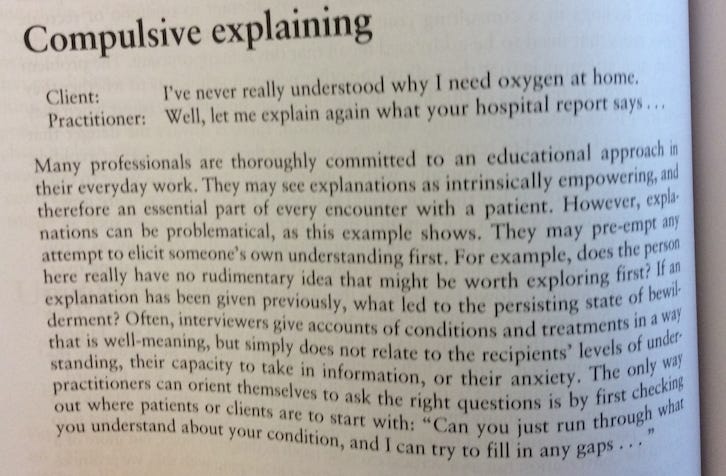The Curse of Knowledge
👻
Thanks for reading the 33rd edition of my sciatica newsletter. This newsletter tracks my research as I write a book about lumbar radicular pain!
On Friday I spoke at Therapy Live about talking to patients about sciatica, and in particular explaining sciatica.
Now, there’s lots of reasons to be wary of clinician's urge to explain things. But in my experience, people with sciatica do really want to know what's going on, and when they do know what's going on they usually feel a bit better and more in control.
To try to help clinicians give better explanations to their patients, I shared a concept I find very helpful, The Curse of Knowledge.
The Curse of Knowledge is the difficulty in imagining what it is like for someone else not to know something that you know.
I first came across the Curse of Knowledge in Steven Pinker's excellent book on writing, A Sense of Style. Pinker says that it is The Curse of Knowledge that's to blame for most bad writing. Think of abstruse academic writing, jargon-filled business writing or opaque instructional manuals. Bad writers mean well, says Pinker; they just know too much about their subject to remember what it's like to know less than they do.
Here's a few times I've noticed The Curse of Knowledge this week.
I was reading a research paper and the authors kept adding new abbreviations. Presumably the authors use these abbreviations every day amongst themselves. As a result, they can't remember what it's like not to know them, so they put them in their article without thinking. Before too long, I'm wading through sentences like this one:
The authors saved some words but lost a reader!
I had a conversation with my neighbour in which he tried to explain to me what his job is. His job isn't complicated: he is the guy who puts those sponsored ads on google and if you click on them he gets money. But it took me ten minutes to understand because he assumed I knew more about tech stuff than I do, so he used words I only half-knew and missed out essential steps that he thought were obvious.
Today, going through my to-do list, I came to an item that just said 'Brian bins'. I have no idea what Brian bins is, or even who Brian is. But when I wrote that item on my to-do list, I did have that knowledge and assumed 'Brian bins' would be clear to Future Me. Now, I'm sure I could look at 'Brian bins' for the rest of my life and never work out what I was trying to say.
According to this podcast, The Curse of Knowledge was even to blame for the Charge of the Light Brigade: instructions that the commanding officer thought were clear were, to his subordinates, misleading.
I think The Curse of Knowledge might be to blame when clinicians' explanations go wrong. It's really hard to imagine what it's like not to have the foggiest idea what sciatica is.
The whole point of The Curse of Knowledge is that it's almost impossible to imagine what it's like for someone else not to know something that you know. But let's try for a second to do just that.
According to Pinker, we learn by putting information into chunks. We give those chunks a name and we can recall them and their meaning instantly. Thus, the string of letters:
M D P H D R S V P C E O I H O P
…is less clear and memorable than the string of chunks:
MD, PHD, RSVP, CEO, IHOP (English readers, IHOP is the International House of Pancakes... but if you're ever in America, go to Denny's instead)
To understand our complex world, we collect chunks and build them together to form more chunks. Let's look at what chunks you need to put together to make a chunk for radicular pain:

Of course, that's not all. We needed other chunks, like spinal cord, action potential and conduction block, to make those chunks. And to really get a good chunk for radiculopathy, you also need to understand the motor side of things, the reflexes, the pins and needles, and the pain:
Now I like to stop and think about how much time and effort it took me to 'make' each chunk in that higgledy-piggledy pyramid thing. Then I feel like I can *kind of* apprehend what The Curse of Knowledge stops me from really seeing: what it’s like not to know what radicular pain is.
The better you know something, the less you remember how hard it was to learn!
Let's leave it there for this week and in part 2 I will write a bit about how I think we can overcome The Curse. [EDIT: part 2 here]
Does The Curse of Knowledge resonate with you? Reply and let me know your experiences!
Til next time,
Tom
P.S. As I was promising you part 2, it reminded me I still haven't posted part 2 of my piriformis syndrome newsletter. Trust me, it's not for want of trying. I feel like piriformis syndrome is a mirage: I keep thinking I'm nearly there, and it disappears! No wonder it drives so many people to madness.
P.P.S. all this talk of explaining reminded me of this insightful passage from John Launer’s book on narrative-based practice. My interview with John is here.






Hi Tom, I'd love to listen to your interview with John Launer but the link is broken. Thanks for another great article.